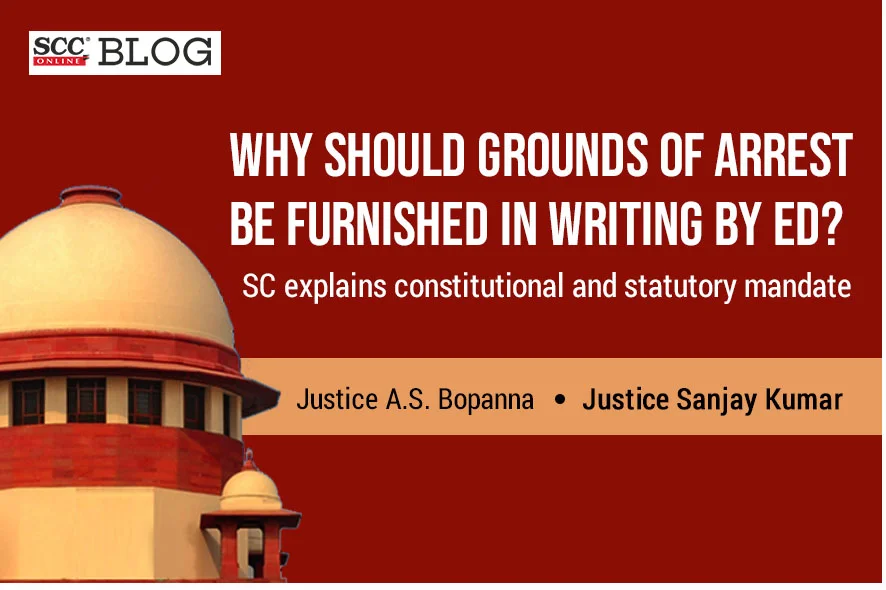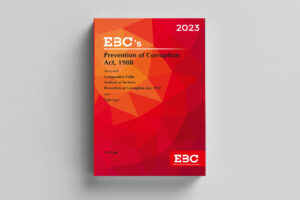Supreme Court: In a criminal special leave to appeal assailing the Punjab and Haryana High Court decision, whereby the accused persons petition to quash their arrest by Directorate of Enforcement (‘ED’) was dismissed, the Division Bench of A.S. Bopanna and Sanjay Kumar*, JJ. set aside the impugned order and held that ED must provide or furnish the grounds of arrest in writing to the arrested person.
Background
In the matter at hand, a First Information Report (‘FIR’) was registered by the Anti-Corruption Bureau, Panchkula against the accused persons including a Special Judge, CBI and ED, Panchkula and Deputy Manager and Promoter of M3M Group for the offences under Sections 7, 8, 11 and 13 of the Prevention of Corruption Act, 1988 (‘PCA’) read with Section 120-B of the Penal Code, 1860 (‘IPC’) on receiving information that favoritism was being shown to the owner of IREO Group and other accused who were owners of M3M Group. Arrests were made exercising the power under Section 19(1) of the Prevention of Money Laundering Act, 2002 (‘PMLA’). Subsequently, the arrests were challenged before the High Court, which was dismissed by the impugned decision. The accused persons’ case was that their arrest under the provisions of the PMLA was a wanton abuse of power/authority and an abuse of process by the ED, apart from being blatantly illegal and unconstitutional. It was also asserted that the ED acted in violation of the safeguards provided in Section 19 of the PMLA.
Analysis of the Issues
Whether the arrest under Section 19 of the PMLA was valid and lawful and whether the impugned orders of remand by the Vacation Judge/Additional Sessions Judge, Panchkula, measured up?
The Court referred Vijay Madanlal Choudhary v. Union of India, 2022 SCC OnLine SC 929, wherein it was observed that provisions of the Code of Criminal Procedure, 1973 (‘CrPC’) shall be applicable in respect of arrest, search and seizure, attachment, confiscation, investigation, prosecution and all other proceedings under the PMLA, insofar as they are not inconsistent with the provisions of PMLA. It was also observed that the power under Section 19 was vested in high-ranking officials and it provided inbuilt safeguards to be adhered to by the authorized officers, such as, of recording reasons for the belief regarding involvement of the person in the offence of money laundering and, further, such reasons have to be recorded in writing and while effecting arrest, the grounds of arrest are to be informed to that person. The Court noted that there is nothing in Section 19 of the PMLA which is contrary to the requirement of production under Section 167 of the CrPC.
The Court also referred to V. Senthil Balaji v. State, 2023 SCC OnLine SC 934, wherein it was affirmed that it is the bounden duty of the authorized officer to record the reasons for believing that a person is guilty and needs to be arrested. It was observed in V. Senthil Balaji (supra) that the Magistrate is expected to do a balancing act as the investigation is to be completed within 24 hours as a matter of rule and, therefore, it is for the investigating agency to satisfy the Magistrate with the adequate material on the need for custody of the accused.
The Court reiterated that it would be necessary to comply with Section 167 CrPC once an arrest is made under Section 19 of the PMLA. While testing the legality of the remand orders, the Court referred to Madhu Limaye, In re, (1969) 1 SCC 292, wherein it was observed that it is necessary that at the stage of remand, the Magistrate directed detention in jail custody after applying his mind to all relevant matters and if the arrest is found in violation of Article 22(1) of the Constitution of India, the order of remand would not cure the constitutional infirmities attaching to such arrest. The Court said that the Additional Sessions Judge, Panchkula did not discharge his duties accordingly and did not record the findings to ascertain whether the ED had recorded reasons to believe that the accused persons were guilty of an offence under the PMLA Act and that there was proper compliance of Section 19 of the Act. Regarding ED’s style of functioning, the Court said that the manner in which arrests were made spoke poorly of it. The Court said that ED, being a premier investigating agency, charged with onerous responsibility of curbing money laundering offences, is expected to be transparent in its every action and conform to pristine standards of fair play in action. Further, the Court said that the ED, mantled with far-reaching powers under the PMLA, is not expected to be vindictive in its conduct and must be seen to be acting with utmost probity and with the highest degree of dispassion and fairness. However, in the case at hand, the ED failed to discharge its functions and exercise its powers as per these parameters.
Regarding the question that whether the arrests were a wanton abuse of power, authority and process by the ED, the Court noted that the way in which the ED recorded the second Enforcement Case Information Report (‘ECIR’) immediately after the accused persons secured anticipatory bail in relation to the first ECIR, and then went about summoning them on one pretext and arresting them on another, within a short span of 24 hours or so, manifested complete and utter lack of bonafides. The Court also noted that the way in which second ECIR was recorded four days after the grant of bail, and it was not possible that the ED would have been unaware of the existence of the first FIR dated 17-04-2023 at that time. The Court also said that the ED’s retaliatory move, of recording the second ECIR and acting upon it, all within the span of a day, to arrest the accused persons, spoke for itself.
The Court explained that it is sine qua non in Section 19(1) of the PMLA that there should be reason to believe in order to arrest a person, however, in the matter at hand, it was unclear as to when the ED’s Investigating Officer had the time to properly inquire into the matter so as to form a clear opinion about the accused persons’ involvement in an offence under the PMLA, warranting their arrest within 24 hours of the interim protection granted to them by the Delhi High Court. The Court also noted that failure on the parts of the accused persons’ to answer the question put to them by the ED would not amount to be sufficient for the Investigating Officer to opine that they were liable to be arrested under Section 19, as the provision requires to find reasons to believe that a person is guilty of an offence under the PMLA. The Court stated that “mere non-cooperation of a witness in response to the summons issued under Section 50 of the PMLA would not be enough to render him/her liable to be arrested under Section 19”.
How the grounds of arrest are to be informed to the arrested person?
The Court noted that no consistent and uniform practice is followed by the ED regarding how the information of ‘grounds’ of arrest is served. The Court said that it is a fundamental right under Article 22(1) of the Constitution guaranteed to the arrested person that, no person who is arrested shall be detained in custody without being informed. The Court also said that the mode of conveying information of the grounds of arrest must necessarily be meaningful to serve the intended purpose of this fundamental right. The Court noted that Section 45 of the PMLA enables the person arrested under Section 19 to seek release on bail on satisfaction to twin conditions, that:
-
the Court must be satisfied, after giving an opportunity to the public prosecutor to oppose the application for release, that there are reasonable grounds to believe that the arrested person is not guilty of the offence and,
-
that he is not likely to commit any offence while on bail.
The Court explained that in order to meet these requirements, it is essential that the arrested person is aware of the grounds of his/ her arrest. Only when the arrested person has knowledge of the facts which led to ‘reason to believe’ of being guilty of an offence, then only the arrested person can plead against the arrest. The Court explained that the language of Section 19 of the PMLA puts it beyond doubt that the authorized officer has to record in writing the reasons for forming the belief that the person proposed to be arrested is guilty of an offence punishable under the PMLA, as Section 19(2) requires the authorized officer to forward a copy of the arrest order along with the material in his possession, referred to in Section 19(1), to the Adjudicating Authority in a sealed envelope, though all the material that is forwarded to the Adjudicating Authority under Section 19(2) is not required to be supplied to the arrested person, however, there is a constitutional and statutory right to be ‘informed’ of the grounds of arrest, which are to be compulsorily recorded in writing by the authorized officer in keeping with the mandate of Section 19(1) of the PMLA. The Court also said that the very purpose of the constitutional and statutory protection would be rendered nugatory if the authorities concerned are permitted to merely read out or permit reading of the grounds of arrest, irrespective of their length and detail, and claim due compliance with the constitutional requirement under Article 22(1) and the statutory mandate under Section 19(1) of the PMLA.
Further, the Court perused the Rule 6 of the Prevention of Money Laundering (The Forms and the Manner of Forwarding a Copy of Order of Arrest of a Person along with the Material to the Adjudicating Authority and its Period of Retention) Rules, 2005, titled ‘Forms of records’, which provides to the effect that the arresting officer while exercising powers under Section 19(1) of the PMLA shall sign the Arrest Order in Form III appended to these Rules. The Court said that there is no valid reason as to why a copy of written grounds of arrest should not be furnished to the arrested person as a matter of course. The Court advised it as a course of action for two primary reasons:
-
In the event such grounds of arrest are orally read out to the arrested person or read by such person with nothing further and this fact is disputed in a given case, it may boil down to the word of the arrested person against the word of the authorized officer as to whether or not there is due and proper compliance.
-
Conveyance of information is not only to apprise the arrested person of why he/she is being arrested but also to enable such person to seek legal counsel and, thereafter, present a case before the Court under Section 45 to seek release on bail, if he/she so chooses.
Therefore, the Court concluded that it would be necessary that that a copy of written grounds of arrest is furnished to the arrested person as a matter of course and without exception, to give true meaning and purpose to the constitutional and the statutory mandate of Section 19(1) of the PMLA. The Court allowed the appeals and set aside the impugned order of the High Court and remand orders of the Additional Sessions Judge.
[Pankaj Bansal v. Union of India, 2023 SCC OnLine SC 1244, Decided on 03-10-2023]
*Judgment authored by: Justice Sanjay Kumar











